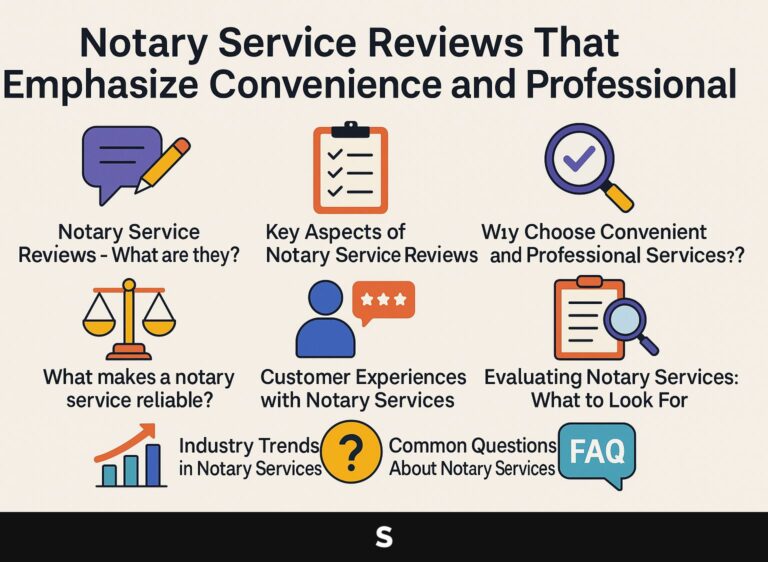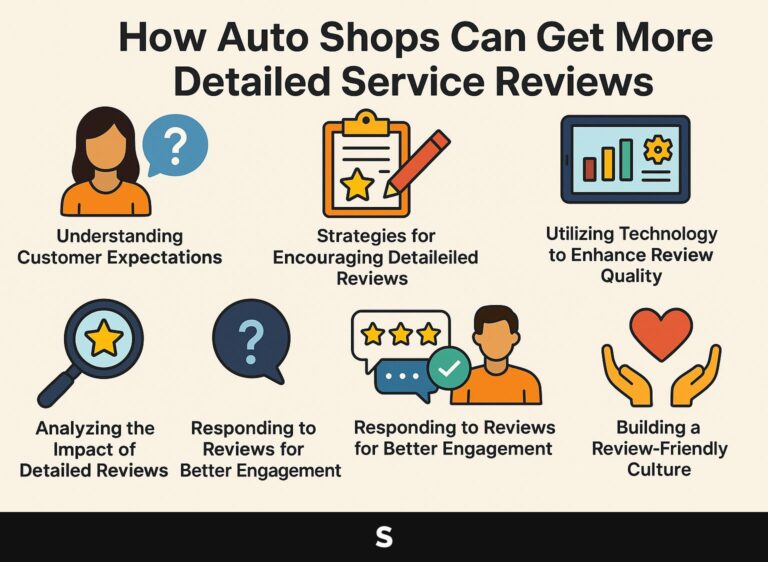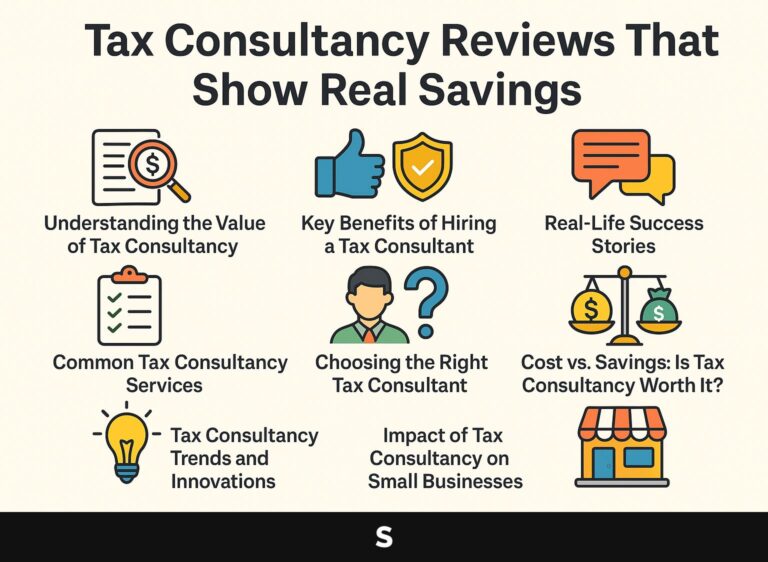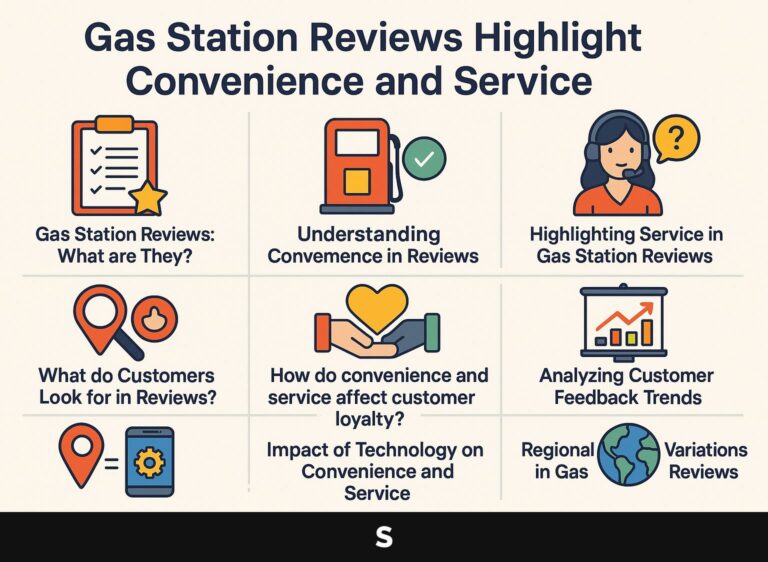How Accounting Firms Can Get Client Reviews That Highlight Expertise
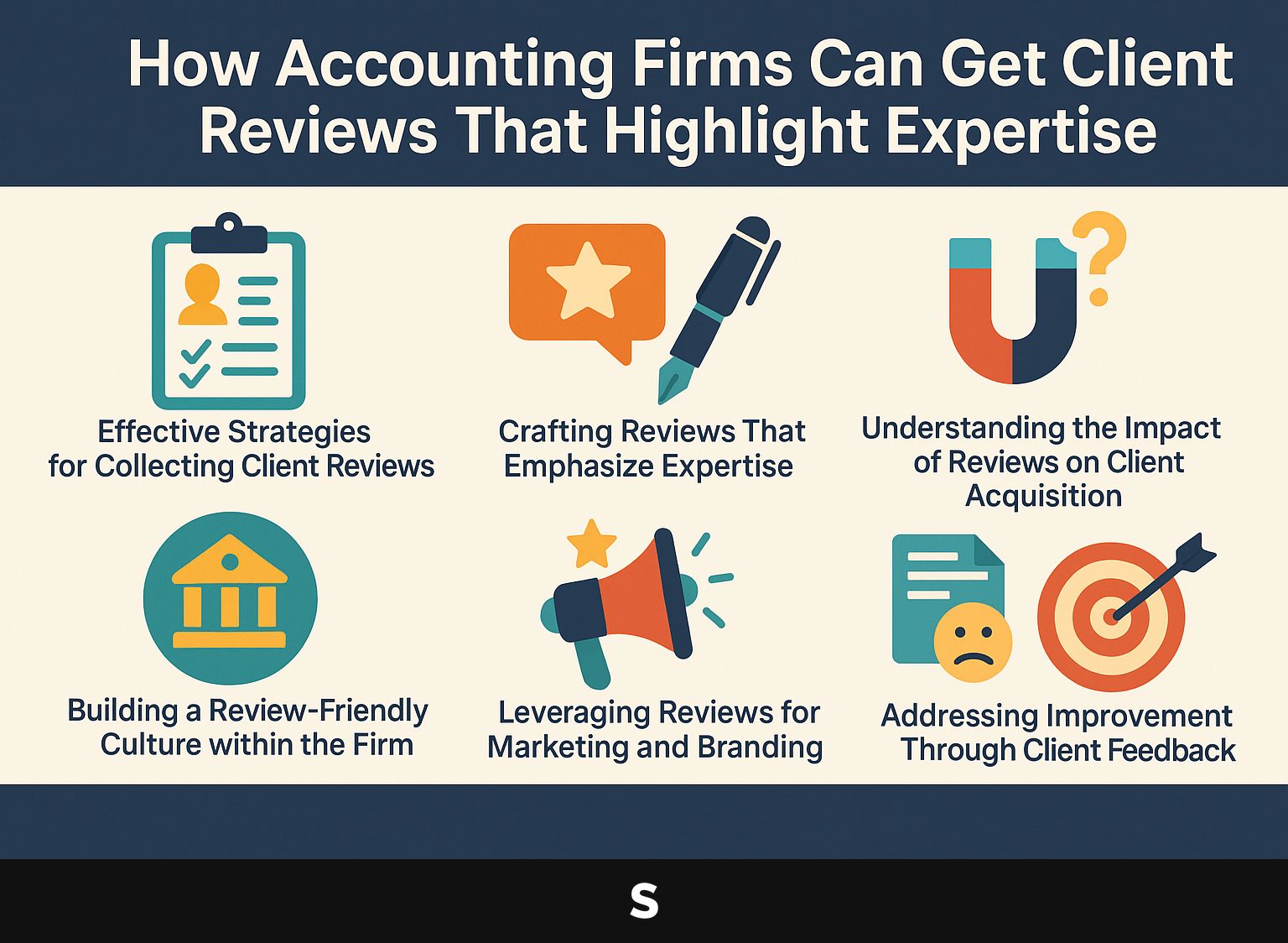
In the current competitive market, client feedback is important for accounting firms wanting to demonstrate their skills. With Spokk.io’s innovative approach, firms can collect professional reviews while respecting client confidentiality. Change simple comments such as “saved me money” into thorough reviews that highlight your team’s skills and personalized services. This article will look at effective ways to collect strong client reviews that improve your firm’s reputation, make the client experience better, and support professional growth.
Key Takeaways:
1.
2.
3.
- How Accounting Firms Can Obtain Client Reviews That Showcase Skills
- Effective Strategies for Collecting Client Reviews
- Writing Reviews That Highlight Knowledge
- Bridging Question
- How Reviews Affect Gaining Clients
- Building a Review-Friendly Culture within the Firm
- Using Reviews for Marketing and Branding
- Addressing Negative Reviews and Feedback
- Continuous Improvement Through Client Feedback
- The Role of Trust in Accounting
- Frequently Asked Questions
- How can accounting firms collect professional reviews?
- What are the benefits of client reviews for accounting firms?
- How does Spokk.io generate client reviews?
- What type of language is used in the reviews generated by Spokk.io?
- Can client reviews help accounting firms attract new clients?
- How can client reviews help accounting firms improve their services?
How Accounting Firms Can Obtain Client Reviews That Showcase Skills
Client reviews are important for accounting firms to show their abilities and build trust, helping them attract and retain more clients.
What are client reviews and why are they important for accounting firms?
Client reviews are feedback from customers that show their experiences and satisfaction with an accounting firm’s services. These reviews help in attracting new clients.
Positive reviews can significantly impact client decisions; according to Google, 79% of consumers trust online reviews as much as personal recommendations. Yelp reports that businesses with four or more stars receive 28% more clicks than those with lower ratings.
To make use of this, accounting firms should ask for feedback through follow-up emails after providing their service, and clearly show reviews on their website and social media.
Utilizing tools like Google My Business and Yelp helps manage reviews effectively, enhancing visibility and credibility in a competitive market.
How can reviews show knowledge in accounting?
Client reviews can show skill and success by describing services that resulted in big financial gains or better results for clients.
For instance, featuring phrases like ‘saved me thousands’ can strongly indicate a financial planner’s effectiveness. Likewise, a case study showcasing a client’s tax reduction after restructuring their income strategy emphasizes the consultant’s knowledge.
Tools such as Spokk.io facilitate gathering these testimonials, allowing businesses to showcase their impact in real terms. By combining data and personal experiences, firms can create convincing stories that build trust and highlight their main abilities in tax planning and financial management.
Effective Strategies for Collecting Client Reviews
Gathering client feedback needs a well-planned method that considers the right time, ways to collect, and privacy to improve the firm’s image. To develop a comprehensive approach, consider following the Ultimate Guide To Customer Feedback Strategy For Business for insights into building an effective strategy.
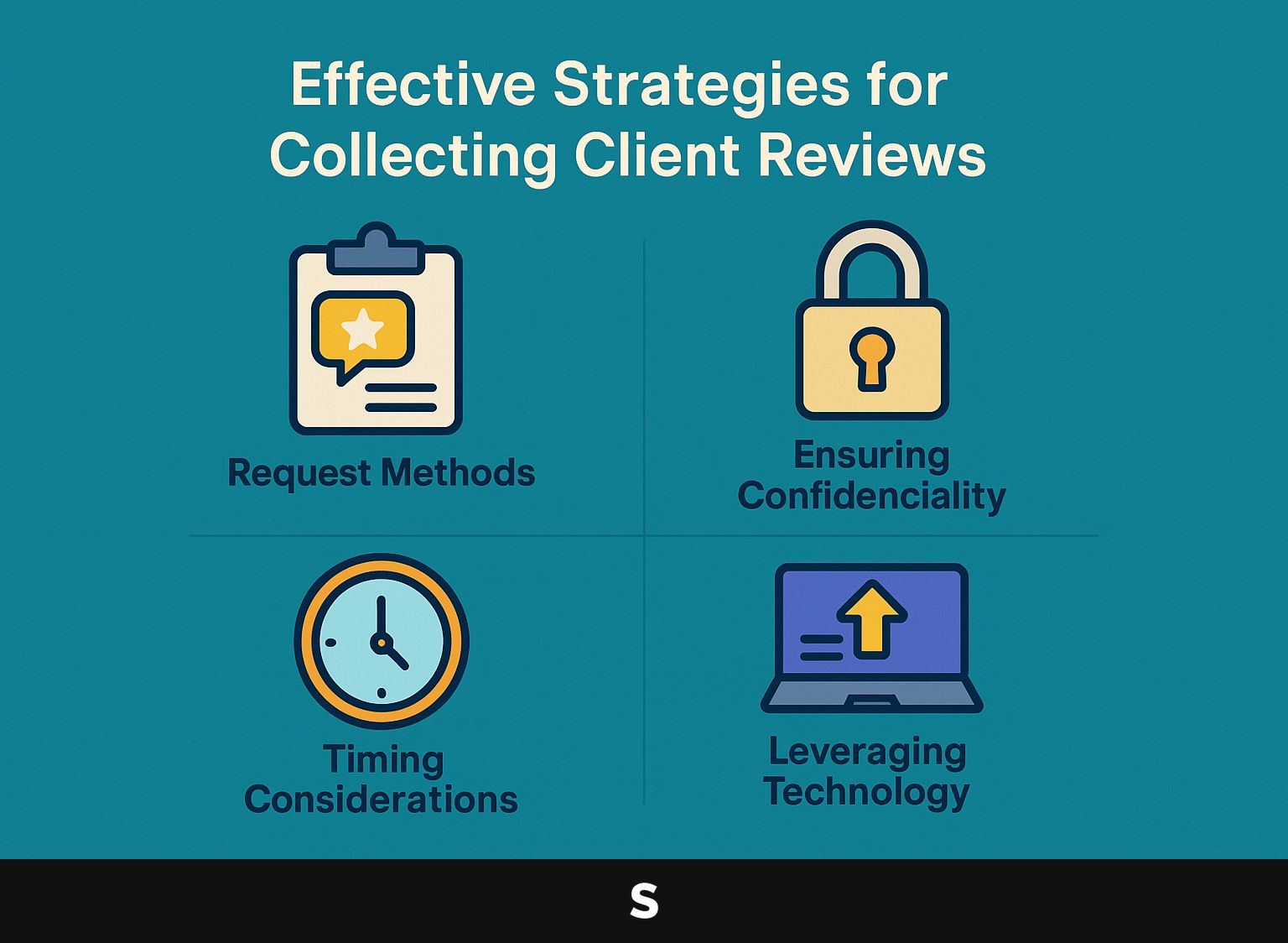
What methods can firms use to request reviews from clients?
Businesses can request reviews in various ways, such as sending personalized emails, making follow-up phone calls, or using platforms like Google and Yelp to send automatic review requests.
To get higher response rates, companies should tailor each request by using the customer’s name and mentioning particular past interactions.
Timing matters; send requests soon after the service is finished while the experience is still recent.
Tools like Mailchimp can make this process easier by setting up follow-up emails to be sent automatically. Platforms like Trustpilot allow businesses to integrate review requests directly after a purchase.
Using these methods can greatly raise the number of positive reviews, which improves brand reputation.
How can firms keep information private while gathering reviews?
Maintaining client confidentiality is paramount in the review collection process, ensuring clients feel secure in sharing their experiences.
To keep information private, companies can use different methods.
- First, consider anonymizing client details in all reviews by using pseudonyms or initials rather than full names. This can reassure clients that their identities are protected.
- Use secure tools like SurveyMonkey or Google Forms to gather feedback, as they encrypt the data.
- Regularly review internal policies regarding information sharing, ensuring employees understand the importance of confidentiality.
- Implement training sessions that emphasize best practices for handling sensitive data, reinforcing a culture of trust and responsibility within the organization.
What role does timing play in requesting reviews?
The timing of requesting client reviews significantly impacts their willingness to provide feedback, with immediate post-service requests yielding the best results.
Research shows that soliciting reviews within 24 hours after a positive client interaction can increase response rates by up to 50%. To implement this, train your team to recognize moments of client satisfaction-such as after a successful project completion or positive feedback-then send a follow-up email with a simple request for a review.
Tools like Trustpilot or Google My Business are effective platforms to direct clients for their feedback. By replying promptly, you keep them interested and greatly improve your total rating.
How can companies use technology to make gathering reviews more efficient?
Technology simplifies collecting reviews, enabling clients to give feedback easily and firms to handle it well.
Tools like Spokk.io can collect reviews automatically, letting clients give feedback through custom forms.
To better organize, connect with CRM systems like Salesforce or HubSpot to sort and monitor feedback.
Connecting these platforms with accounting software like QuickBooks means client feedback directly influences billing and project tasks, providing a smooth process.
When businesses set up automatic alerts and messages, they can improve response rates and maintain regular client feedback.
Writing Reviews That Highlight Knowledge
Creating reviews that highlight skills means helping clients share their experiences in a manner that showcases the firm’s strong points and abilities. To effectively craft such reviews, it’s beneficial to study various positive review examples (as mentioned in our guide on mastering positive reviews), which can inspire the best ways to articulate expertise.
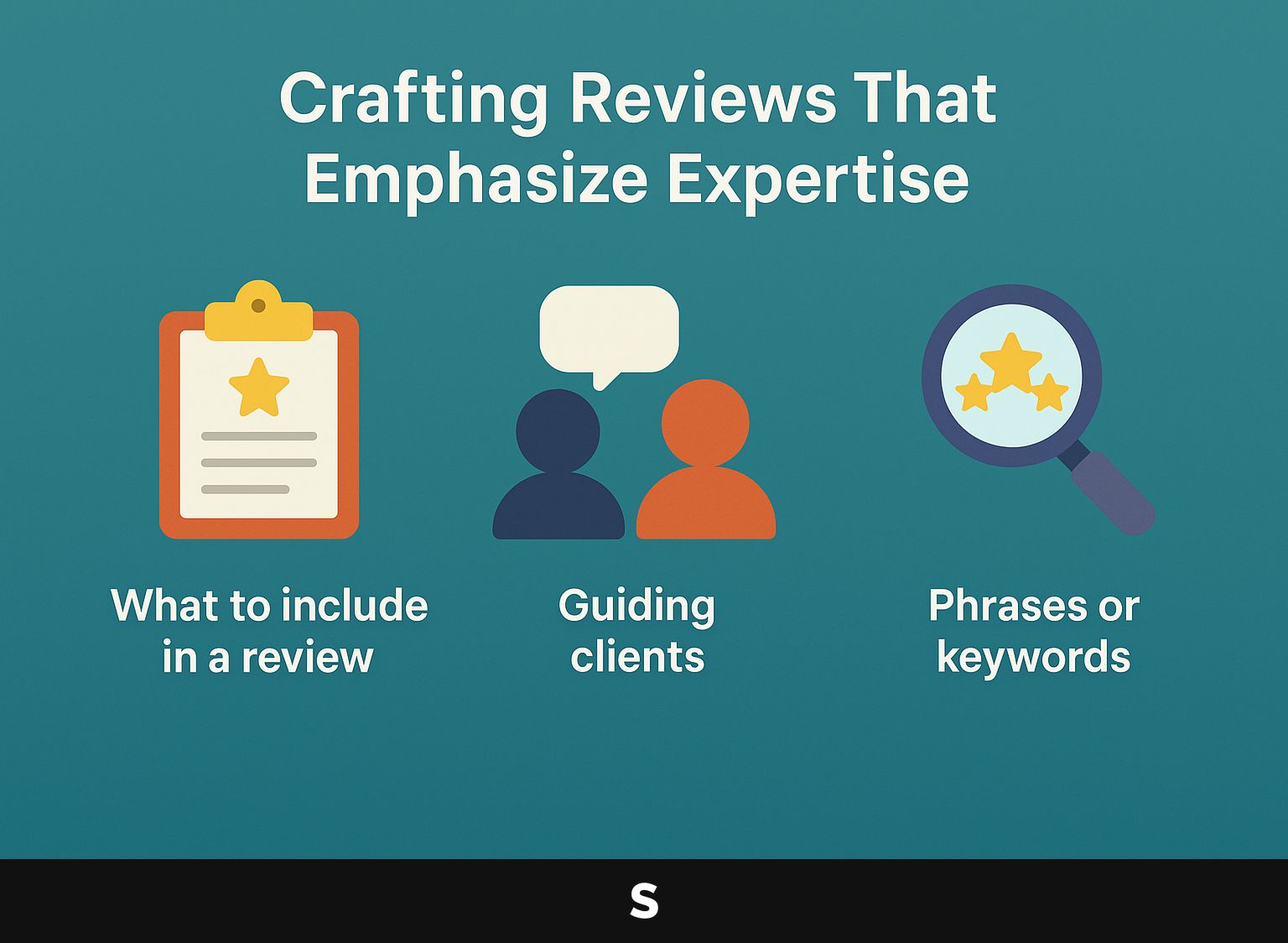
What details should be included in a review to show knowledge?
To clearly show knowledge and skills, reviews should have specific parts like clear explanations of the services provided and measurable outcomes.
Incorporating the context of the review helps potential clients understand the circumstances surrounding the services. For example, a review on Spokk.io could detail how a social media strategy led to a 200% increase in engagement within three months.
Highlighting specific actions taken, such as the introduction of targeted ads or influencer collaborations, informs readers of concrete methods and results. Including metrics like conversion rates or follower growth gives weight to the review, demonstrating the provider’s effectiveness in real-world applications.
How can firms guide clients in writing impactful reviews?
Businesses can make reviews better by providing clients with suggestions or advice to help them clearly share their good experiences.
For instance, supplying a template that includes specific questions can guide clients in their responses. Questions like, ‘What aspect of our service impressed you the most?’ or ‘How did our product solve your problem?’ encourage detailed feedback.
Offering incentives like discounts or gift cards for completed reviews can motivate clients to participate. By creating an easy and engaging review process, firms can collect richer testimonials that genuinely reflect their value.
What words or phrases connect with possible clients?
Specific phrases and keywords within reviews can significantly influence potential clients’ perceptions and decisions.
Phrases such as ‘saved me money,’ ‘thorough and responsive,’ and ‘exceeded expectations’ clearly show real advantages and reliability.
Clients often respond positively to phrases highlighting cost savings, as they reflect efficient solutions. Terms emphasizing responsiveness indicate a reliable service provider, showcasing strong customer support.
To make the most of these phrases, think about adding them to your marketing content or when asking for feedback. By doing so, you can attract and reassure potential clients while enhancing your brand’s credibility.
Bridging Question
How important are client reviews in building trust and credibility in the accounting field?
Client reviews serve as a modern form of referrals, significantly influencing potential clients’ perceptions. To increase trust, use a methodical way to collect feedback.
For instance, after completing a project, send clients a brief survey via tools like SurveyMonkey or Google Forms, specifically asking about their experience and satisfaction. Show positive reviews clearly on your website and use them in your marketing content.
Websites like Trustpilot and Yelp can increase your visibility by sharing real customer feedback, which strengthens your reputation in a challenging market.
How Reviews Affect Gaining Clients
Knowing how reviews affect getting new clients is important for accounting firms wanting to improve their marketing plans and grow their client base.
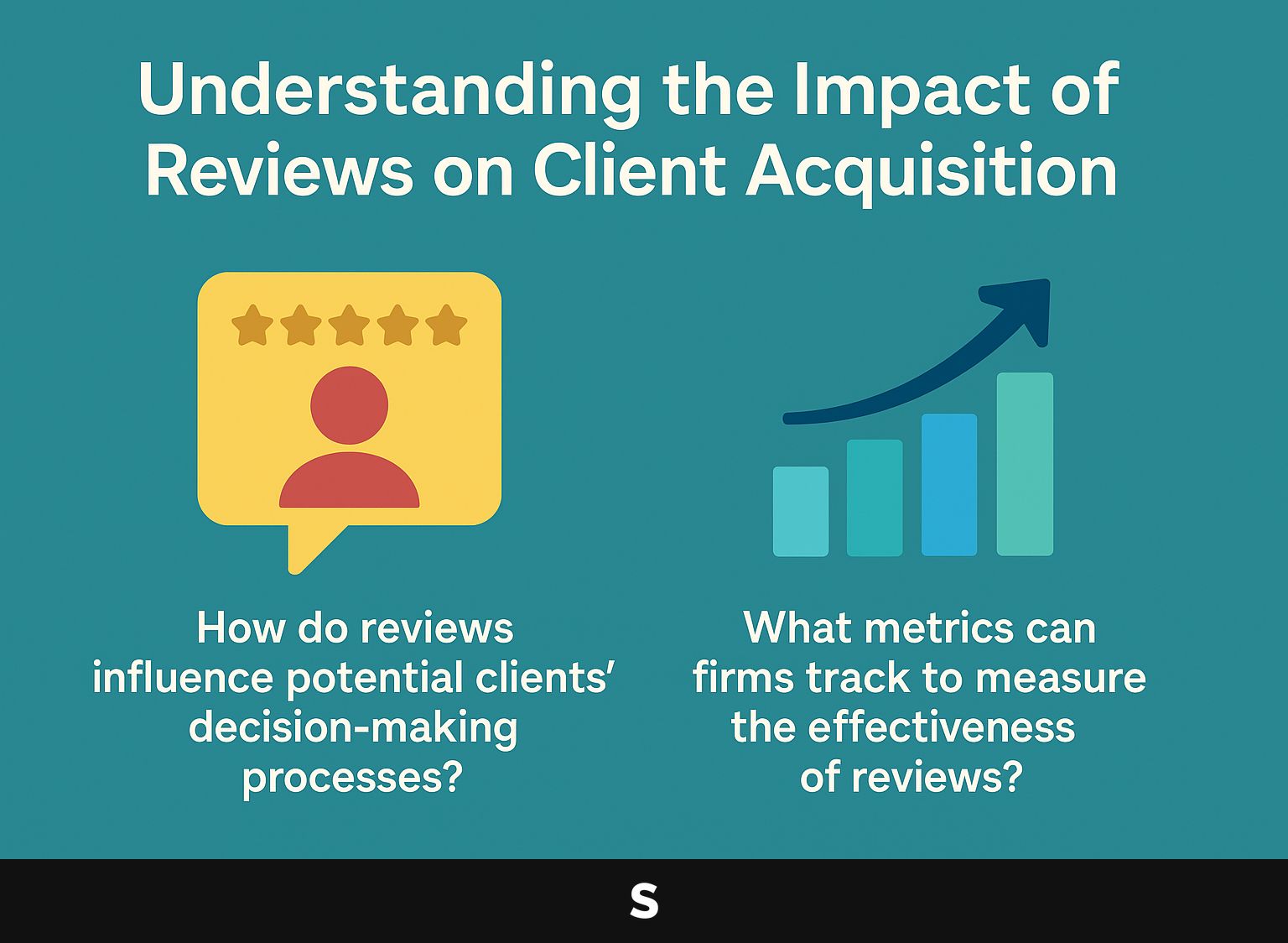
How do reviews affect the choices of possible clients?
Reviews play a critical role in shaping potential clients’ perceptions and decisions, often serving as the deciding factor when choosing an accounting firm.
According to a recent survey, approximately 84% of clients trust online reviews as much as personal recommendations. Companies should ask happy customers to write good reviews on sites like Google My Business or Yelp.
Including testimonials on your website can improve trustworthiness. For example, showcasing a ‘Client of the Month’ feature highlights success stories, inviting potential clients to see the value firsthand.
Regularly monitoring and responding to feedback also demonstrates engagement and a commitment to service, which can sway undecided clients.
What metrics can firms track to measure the effectiveness of reviews?
Tracking specific metrics can help firms gauge the effectiveness of their review collection strategies and their impact on client retention.
Key performance indicators (KPIs) to monitor include the number of reviews collected each month, which reflects engagement levels, and overall rating trends that reveal customers’ satisfaction over time.
Track conversion rates from inquiries to clients; this metric demonstrates the effectiveness of reviews in converting potential clients.
Tools like Google Analytics can help look at traffic from reviews, while platforms like Trustpilot show detailed information on review performance. Regularly checking these metrics will help companies improve their strategies and keep clients.
Building a Review-Friendly Culture within the Firm
Encouraging a supportive environment for reviews in an accounting firm helps employees and clients participate positively in giving feedback.
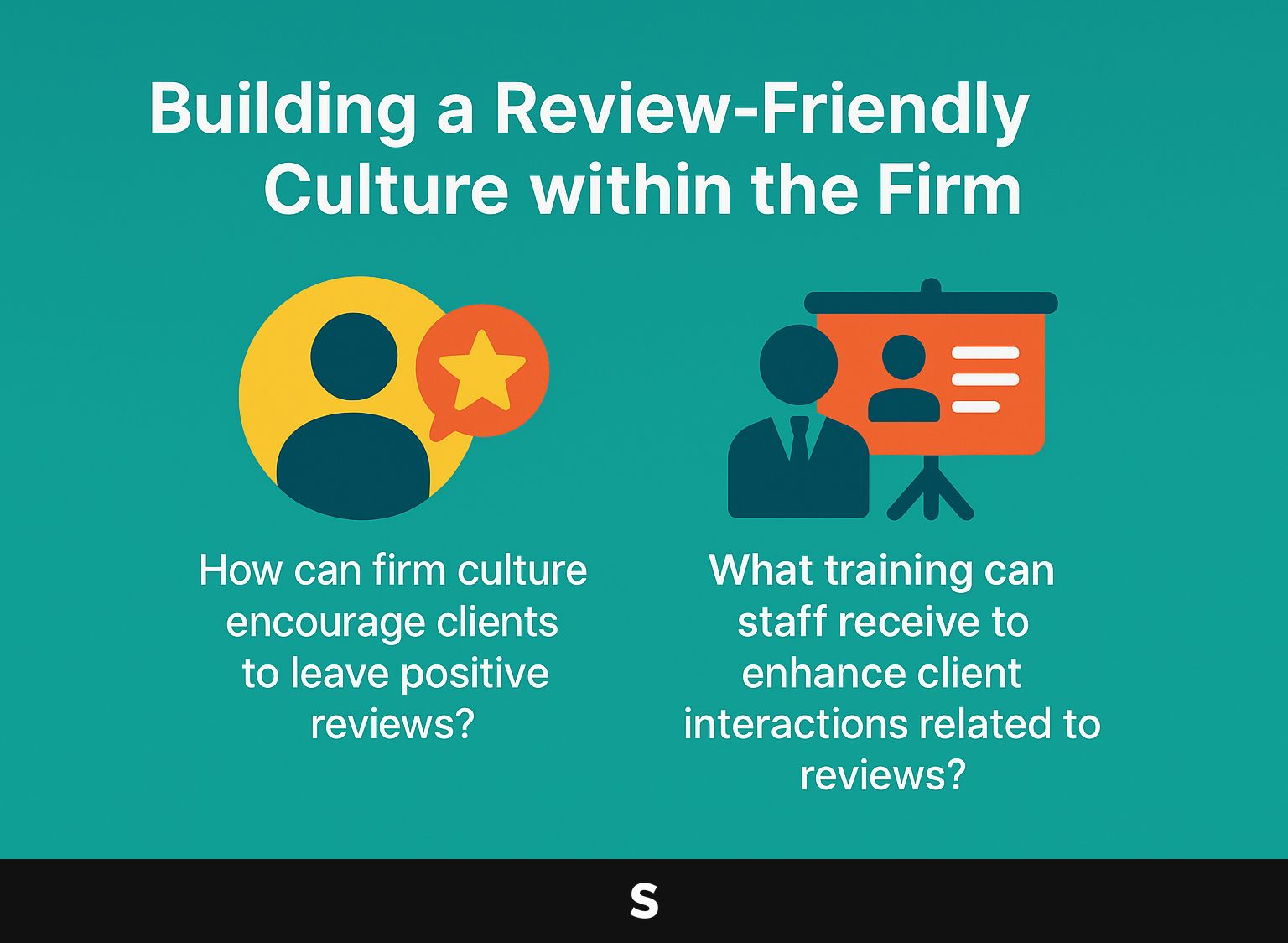
How can firm culture encourage clients to leave positive reviews?
A supportive and responsive firm culture can significantly increase the likelihood of clients leaving positive reviews.
To improve client satisfaction, set up regular meetings where clients can share their concerns and suggestions. This keeps communication open and shows clients that their opinions are important.
Consider hosting client appreciation events, such as exclusive workshops or networking gatherings, to strengthen relationships. Tools like SurveyMonkey can gather formal feedback, while platforms like Eventbrite can make event planning easier.
By actively engaging clients in these ways, firms can create a culture of trust and responsiveness that encourages glowing reviews.
What training can staff receive to improve how they handle client conversations about reviews?
Teaching employees how to communicate well and handle customers can improve their dealings with clients, resulting in better reviews.
Implementing training programs focused on client engagement can significantly impact your business’s reputation.
Consider enrolling employees in courses like Dale Carnegie’s Effective Communications or Crucial Conversations. These programs emphasize active listening, empathy, and persuasive communication.
Role-play different client situations to improve these skills. Establishing a client-centric culture encourages team members to ask for feedback proactively, increasing the chances of receiving positive reviews.
Creating a basic survey that runs after interactions can make it easier to gather reviews and help keep improving your service.
Using Reviews for Marketing and Branding
Using client reviews well in marketing and branding can greatly improve how noticeable and trustworthy an accounting firm is. For further insights, consider our deep dive into mastering customer feedback management, which highlights effective strategies for leveraging customer insights.

How can firms showcase reviews in their marketing materials?
Using client feedback in marketing materials can help tell a strong story about the company’s skills and how happy clients are.
Place reviews carefully on different platforms. On your website, create a dedicated testimonials page featuring glowing client feedback, supplemented with client photos or logos for authenticity.
Brochures should include standout quotes prominently, possibly with a QR code linking to video reviews. For social media, share small client testimonials as attractive graphics or short video clips, tagging the clients when you can to make them more believable.
Tools like Canva can help create these posts, while platforms like Trustpilot are useful for collecting and showing reviews effectively.
What platforms are best for displaying client reviews?
Choosing the best places to show client reviews is important for getting the most attention and effect.
Consider using Google My Business for its local SEO benefits, helping your business appear in local search results, especially for brick-and-mortar stores.
Yelp offers a strong focus on service-based industries, providing a trustworthy reputation that can drive new customers.
Displaying reviews directly on your firm’s website builds trust and can greatly affect potential clients’ choices.
Together, these platforms make sure that reviews are seen by different groups and help maintain a strong reputation for your business in various places.
Addressing Negative Reviews and Feedback
Handling negative reviews well is essential to keep an accounting firm’s trustworthiness and good name.
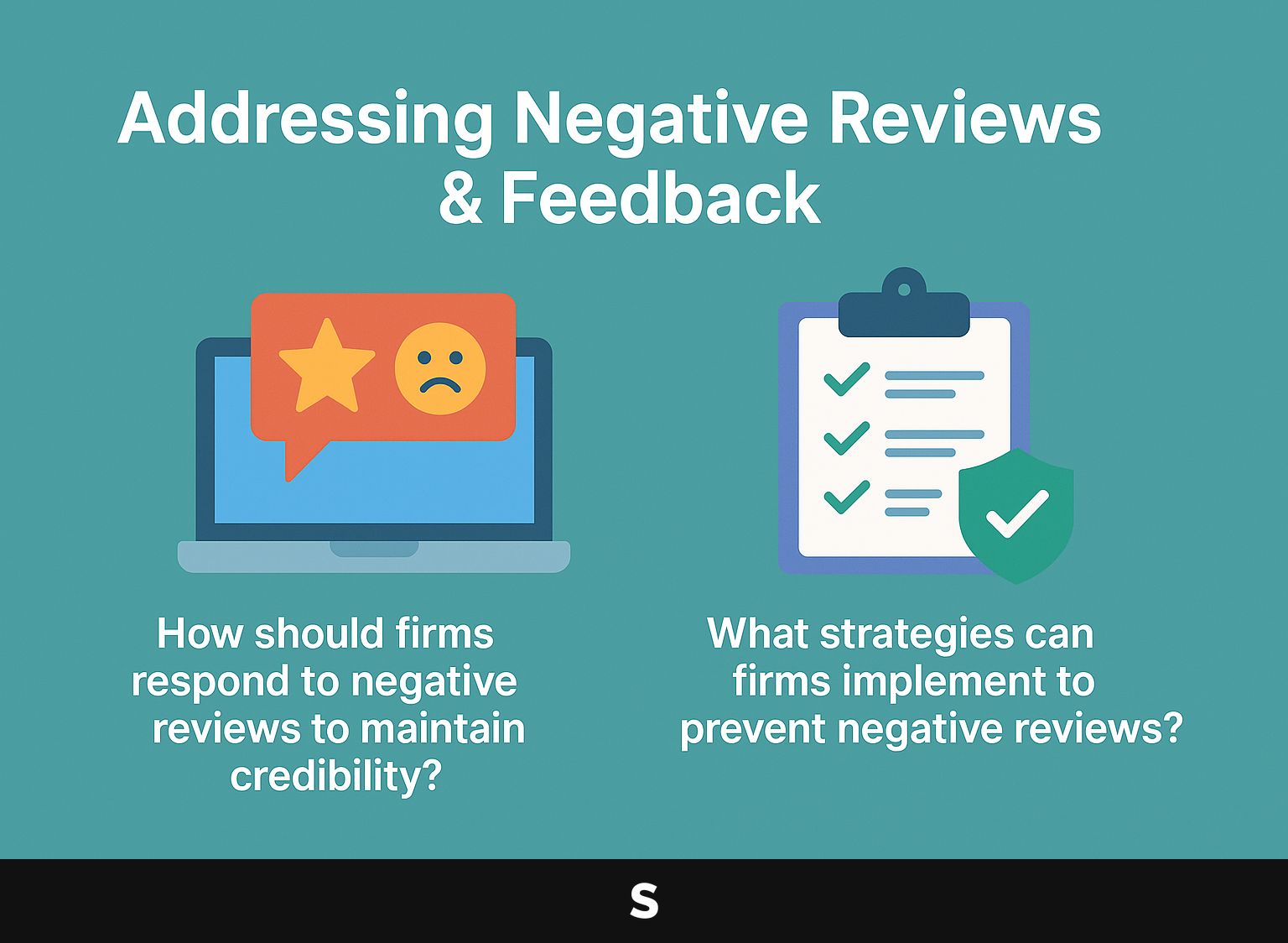
How should firms respond to negative reviews to maintain credibility?
A firm’s response to negative reviews can significantly impact client perceptions and overall credibility.
To handle negative feedback well, begin by quickly recognizing the problem. For example, reply with a message like, “Thank you for your feedback; we’re sorry to hear about your experience.”
Next, provide a clear solution. If a customer faced service delays, outline how you’re improving processes to prevent recurrence. Encourage offline discussions by inviting them to contact your support team directly for a resolution.
This approach shows that you value feedback and helps maintain trust with current and potential customers.
What strategies can firms implement to prevent negative reviews?
Businesses can use modern methods to lower negative feedback and increase customer satisfaction.
A good way to stay connected with clients is to have regular check-ins, using surveys or personal meetings. This allows you to gauge their satisfaction levels and address potential issues before they escalate.
Establish feedback loops whereby clients can easily communicate their concerns. For example, tools like SurveyMonkey can help gather feedback quickly, while platforms like Slack allow for open communication in real time.
When companies frequently communicate with their clients, they can create stronger relationships and encourage teamwork, which can reduce the chances of getting negative feedback.
Continuous Improvement Through Client Feedback
Regular updates based on client feedback help firms change and improve their services to more effectively satisfy client needs. Curious about how Spokk.io surpasses competitors like InMoment? Our analysis explains why continual improvement is crucial.
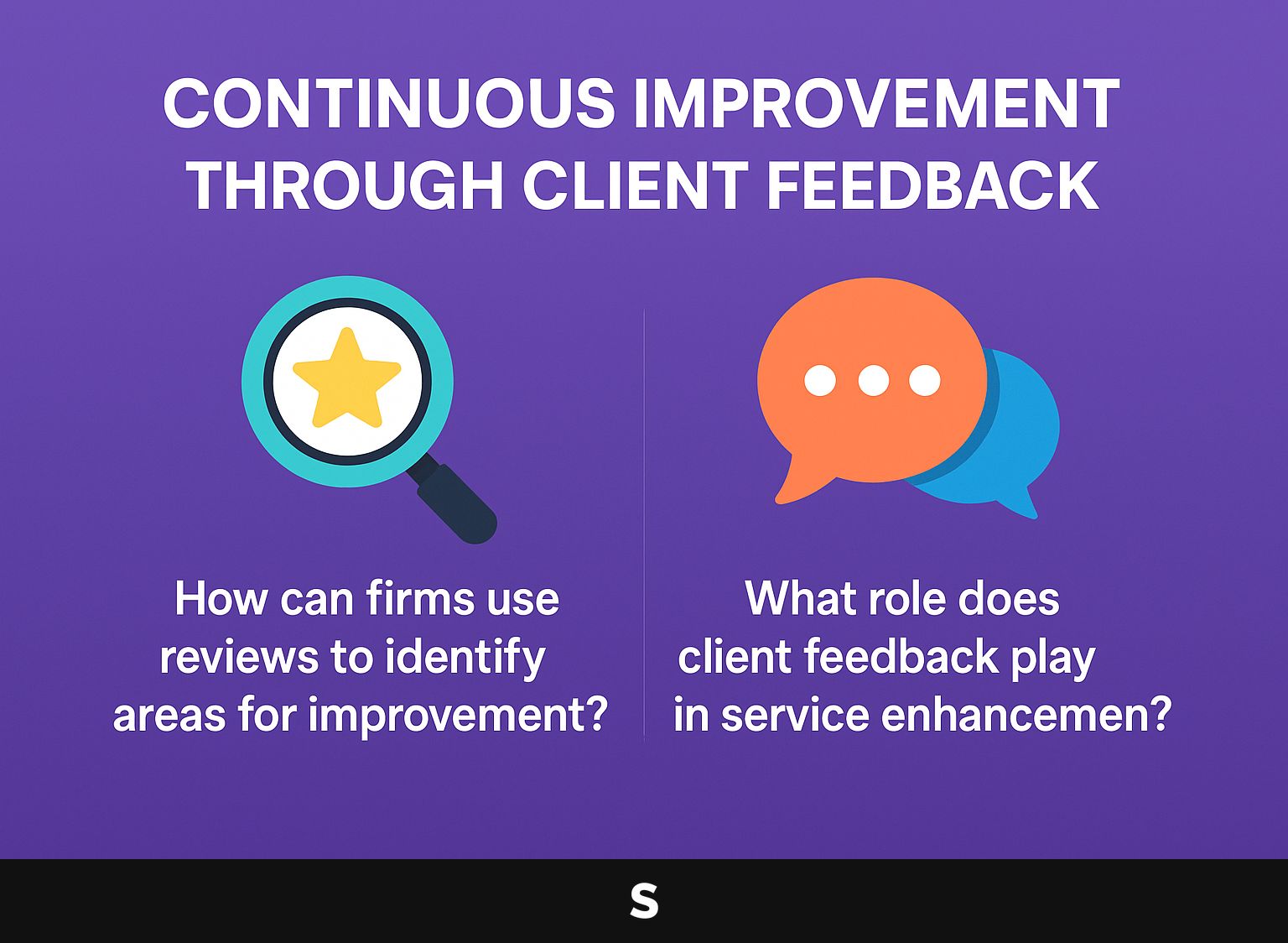
How can firms use reviews to identify areas for improvement?
Reviews can help identify areas where companies can improve their services and relationships with clients.
To analyze reviews effectively, start by compiling them into a spreadsheet. Look for recurring themes in client feedback; categorize them into strengths and weaknesses.
For instance, if multiple clients mention slow response times, flag this as an area for improvement. Tools like sentiment analysis software can also help quantify positive and negative feedback.
Use tools like Google Alerts to monitor new reviews continuously, ensuring you stay updated on client perceptions and can make timely adjustments to your services.
How does client feedback help improve services?
Client feedback is important for developing services that match what clients want and need.
To successfully use client feedback, firms can follow different methods.
- First, use organized surveys after the service to collect detailed feedback. For example, a hotel chain might ask guests about room cleanliness and staff friendliness.
- Next, establish regular client check-ins through calls or emails, allowing clients to voice concerns directly.
- Set up a team focused on collecting feedback to identify patterns and recommend practical improvements to services.
A successful case is Starbucks, which revamped its menu based on customer taste tests and suggestions, resulting in a 15% increase in engagement.
The Role of Trust in Accounting
Trust is essential in accounting, and client reviews play a key role in building and keeping that trust.
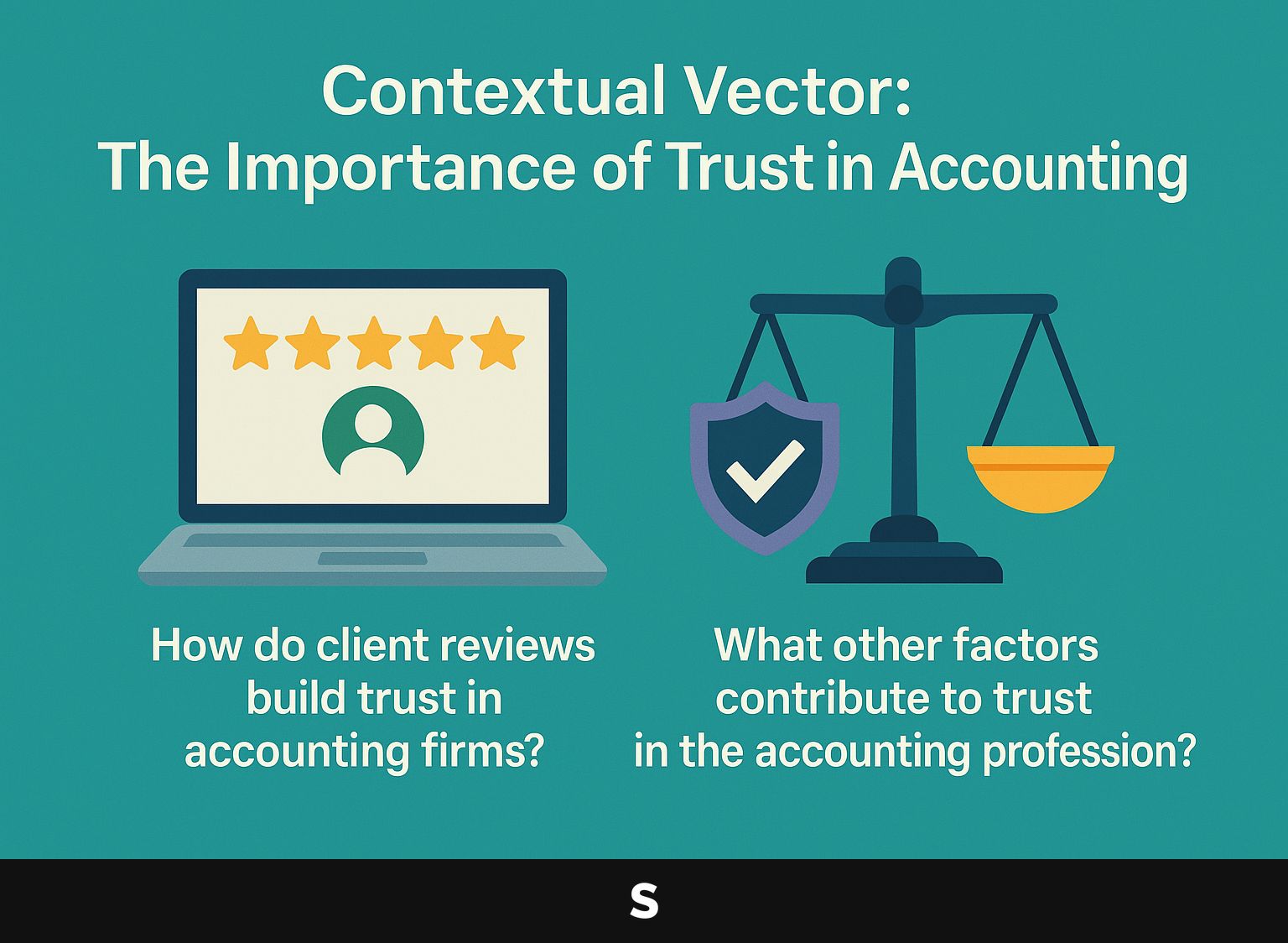
How do client reviews build trust in accounting firms?
Client reviews create trust by showing that a firm is reliable and effective, and this is important for bringing in new clients.
A recent study showed that 79% of people trust online reviews as much as they trust advice from friends, showing their influence on choices.
To make the most of this, businesses should ask happy customers to write reviews on sites like Google My Business or Yelp.
Displaying positive reviews on your website can greatly increase trustworthiness. Think about sending follow-up emails after providing a service, asking customers to leave reviews, and giving them small rewards for doing so.
This proactive method gets more reviews and strengthens your business’s good reputation.
What other factors contribute to trust in the accounting profession?
Trust in accounting is built on honest practices, open communication, and a track record of success, not just reviews.
To build trust, accountants should communicate clearly and on a regular basis. For instance, regularly updating clients on project statuses and potential issues can build confidence.
Displaying qualifications, such as CPA certification or higher degrees, gives clients confidence in your skills. Clear pricing, with detailed proposals and breakdowns, avoids confusion and builds trust.
Answering clients quickly and with a personal touch can increase their trust in you. These actions show you truly care about their financial health.
Frequently Asked Questions
How can accounting firms collect professional reviews?
Accounting firms can use platforms like Spokk.io to collect professional reviews from their clients. These platforms keep information private and use AI to create reviews that showcase the firm’s skills.
What are the benefits of client reviews for accounting firms?
Feedback from clients can demonstrate an accounting firm’s skills and draw in new clients. They also give useful feedback for the firm to make their services better.
How does Spokk.io generate client reviews?
Spokk.io uses AI to generate client reviews based on keywords provided by the client. These reviews are written to showcase the skills of the accounting firm and protect privacy.
What type of language is used in the reviews generated by Spokk.io?
Spokk.io creates reviews that use professional and positive language to showcase the skills of the accounting firm. They are designed to portray the firm in a positive light to potential clients.
Can client reviews help accounting firms attract new clients?
Yes, client reviews can be a powerful marketing tool for accounting firms. By focusing on the skills of the company, these reviews can bring in new clients and help the company expand its business.
How can client reviews help accounting firms improve their services?
Client reviews give important feedback for accounting firms. By knowing what their clients like and what needs to be better, firms can improve their services and better help their clients.

